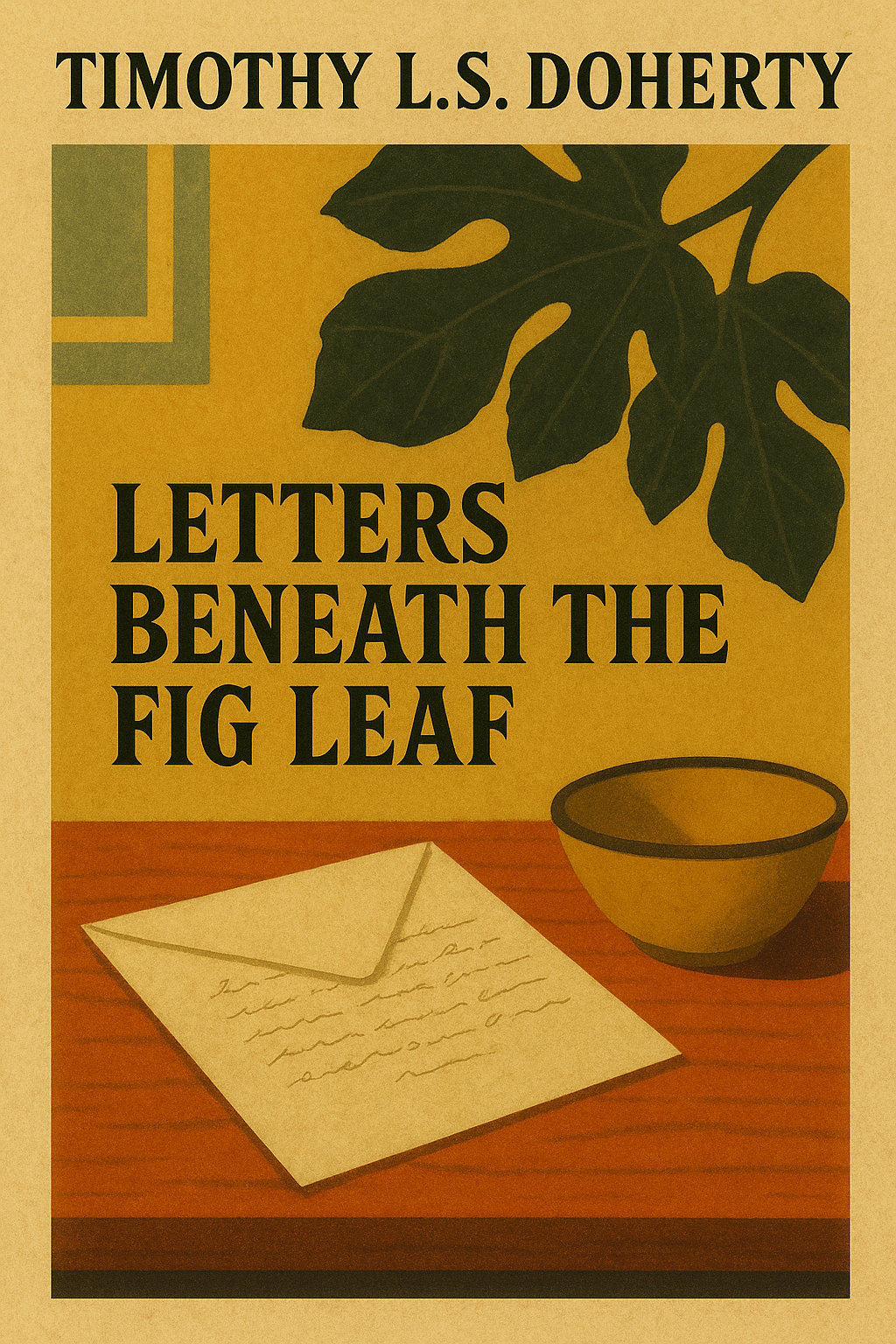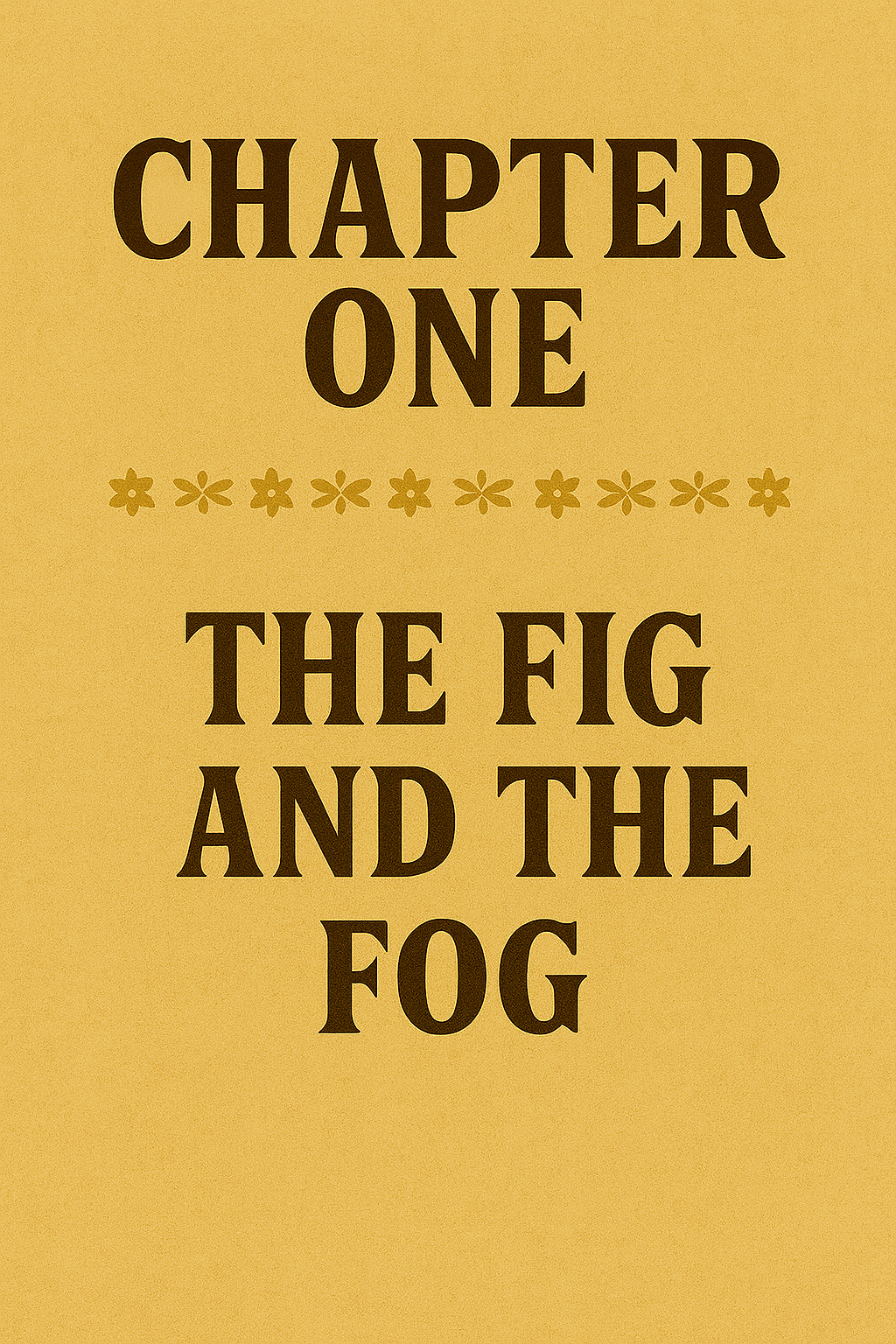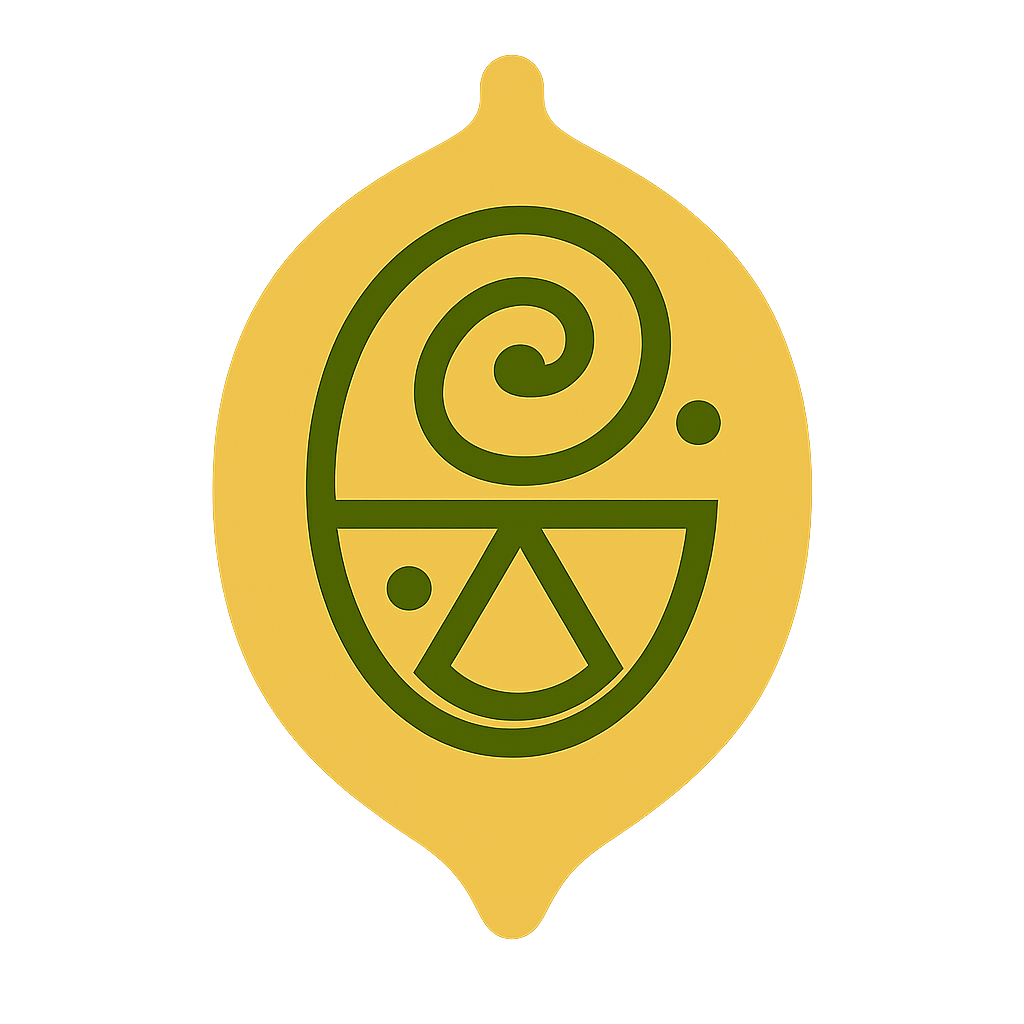— ✦ ☉ ✦ —


A Letter Beneath the Fig Leaf —
So.
You’ve found the fig. Or it found you.
Hard to tell in places like this, where wind carries more memory than mail, and every house has a mouth in the wall that forgets how to close.
If you’re reading this, I won’t stop you. But I should warn you...this isn’t the kind of story that wants to be read. It wants to be misread. It wants you to trace your finger down the fog’s spine and call that a map.
Names won’t help here.
They rot first.
Then come the mirrors.
This chapter is a throat clearing.
A breath before your face remembers who it used to belong to.
If the fig tastes strange, it’s because it isn’t ripe.
And never will be.
But I’d advise you to eat it anyway.
Because the scroll is listening.
And ink’s no good unless it’s fed.
Now walk.
PART I — Where the Fog Settles
The room had no corners.
Not exactly.
The stones refused to meet cleanly, as if the mason had paused mid-stroke, then resumed in a different rhythm, like a song remembered differently, each time in a new tongue.
Morning, if the name still held, hung low and rancid...yellow as a sickbed prayer. Behind the fog, light stirred but would not wake.
Séamus opened his eyes and immediately shut them again.
There was sweetness in his mouth, a foreign plumpness. Something too soft, too slow.
His tongue pressed against pulp.
He was chewing something sticky, wet…fig, or something like it—just before the name dissolved,
like steam from a cracked Saltillo tile.
He sat up slowly, expecting a spine that wasn’t his to crack the wrong way. It didn’t. The room smelled like dust and old rosemary.
On the floor beside him, near a clay pitcher he didn’t remember emptying, water pooled in the filthy grout lines. Not enough to reflect. Just enough to glisten.
His hand was closed.
He opened it.
In his palm: half a fig. Split, purple-black, the skin veined like a lung. The pulp exposed. No seeds. No bite mark. Just opened—softly, deliberately. Not eaten. Offered.
He stood, knees resisting, bones not entirely synced to identity. The window was narrow and green at the edges, not from paint, but from glass that remembered moss. Outside, the fog moved like a memory being rewritten mid-sentence.
He pressed his palm to the window. The fig’s juice smeared a dark line on the glass. Below it, the street sat still.
Stone.
Narrow.
Paved with nothing sharp.
He did not know the name of the town.
He did not know the name of the room.
He knew, without question, that there were no mirrors in the house.
He also knew this wasn’t the first time he had woken here.
A smell drifted in through the window now. Dry earth. Crushed thyme. Burnt sugar. And beneath it all, the scent of something salted and distant. Not sea. Not sweat. Memory.
The wind came from the east, but circled like it had forgotten where to go. It pressed against the house like a mouth about to speak, then fell silent.
He turned from the window and looked at the wooden table near the wall.
At its center sat a shallow bowl. Hand-pressed, sea-whispered clay, marked with ghost-spiral impressions.
It sat there alone, cracked but still upright.
Meant for offerings, for gruel, for reading what the day might bring.
Still whole enough to remember its own shape.
He said aloud, “Séamus.”
It echoed wrong.
Like the name had skipped across the room and bumped into something else...another version of him, already in motion, already leaving.
He placed the fig in the bowl.
The bowl tilted.
Somewhere beneath him, under the floor or in the tiles or in the pooling water on the floor, moving where water shouldn’t move, something shifted.
He stepped back.
The room did not.
He put on his sally cap—the one he always wore when traveling, though he couldn’t say how he’d arrived—and opened the door.
At the threshold, he sang low, into the fog. A tune his father used to sing:
“I had a hat when I came in,
I hung it on the rack—
and I’ll have a hat when I go out,
or I’ll break somebody’s back.”
The fog didn’t flinch. It waited.
And so did the wind.
🕯️ PART II — The Stranger’s Table
The path downhill was dry in some places, damp in others, as if the fog had chosen favorites.
Stone houses staggered along the slope, leaning in to whisper, their clay tiles flaking like burnt skin.
Séamus walked without direction, but with a sense of pattern — not memory, but a muscle logic.
He counted six steps from the door to the first fig tree.
Seven more, and he reached the dogs—not there, but they should’ve been.
Boar dogs. Thick-necked. Trained to run the ravines.
Nine more steps to the café that had no name.
The chairs were wooden, hand-worn, none of them matching. Tables placed deliberately to seem careless.
A man smoked in silence while reading a newspaper that hadn’t turned a page in days. A woman poured coffee without looking up, without speaking.
Séamus sat.
Not because he was tired. But because he knew he was meant to.
She brought a thick-walled tumbler, cobbled from blue sea glass, clouded from time and salt.
No sugar. No saucer. No price. He nodded. She did not return it. The first sip tasted like stone and a whisper of something warm from a spice market he didn’t remember — like a fragrant dust that had aged kindly.
The newspaper man turned a page that had nothing printed on it. He seemed satisfied by whatever he found there.
Another woman passed the café, walking a lamb on a ribbon of blue cloth. Séamus didn’t question it. He noted the lamb’s eyes: glassy, wrong, human.
A window behind him slammed open and stayed there...no breeze, just intention.
The woman behind the counter whispered to no one, “Solano.”
And everyone in the café went still—not afraid, just… remembering.
The wind arrived a moment later, perfectly on time.
Thick and dry, it brushed past Séamus with the scent of roasted pomegranate, blooded stone, and someone else’s laundry.
The table creaked, not loudly, but in a tone that felt like a warning.
A fig dropped from a branch onto the dirt beside his chair.
He turned.
A boy stood there, barefoot, skin the color of wind-burnished brick. Red-eyed. Still. Watching.
He said nothing. He held out one hand.
Empty. Palm up.
Séamus did not move.
The boy closed his fingers, slowly, as if gripping a weight.
Then he said, “Not this time.”
And walked away.
🕯️ PART III — The Librarian’s Note
The house had not changed, but the wind had rearranged the silence inside.
When Séamus pushed open the door, the floor was drier than before, as if the fog had been wrung out of the Saltillo.
The smell had changed, too...far less like rosemary and now more like iron and lemon.
Dust clung in the corners like it had been brushed there intentionally, as if the house needed shadow to orient itself.
The bowl on the table was empty.
No fig remained.
But beside it now, as if it had always been there and had only just remembered to appear, lay a slip of paper, creased, soaked, edges curled like they’d recently been licked by tidewater.
He stepped forward, slower than before.
The handwriting was angular. Confident. Familiar, like an old bruise.
It read: “Go to the place where the thread first broke.”
No name. No seal.
No instructions beyond that.
As if he were expected to understand where that place was.
As if he’d broken the thread himself!
Underneath the note was a small object. He reached for it.
Figwood. Knotted, soft at the edges, smoothed by handling. Carved into the shape of a key. Though not one that would fit just any door. It had flat teeth and a spiral stem. It had a hole through its head, like a charm.
Its color was not from stain. It was from something else.
Salt. Worn into the grain.
The wood smelled of brine and pulp.
He knew that smell.
A childhood near a sea he couldn’t recall. Or someone else’s childhood.
Or the fig in his mouth this morning. All of it, folded.
He turned the key in his hand. It was warm.
Something under the table creaked… not loudly, but low and old, like breath pulled through buried stone.
He knelt and touched the Saltillo tile.
The grout between two slabs had begun to blacken.
Wet. Slow. Not from above.
From beneath.
He exhaled, and somewhere under the grout, it echoed — not quite in sync.
As if something else was trying to match his rhythm.
Water. Or ink.
He stood and tucked the key into his coat pocket, where it settled…as if it had never left, and had never truly lived there before.
He folded the note once. Then again.
Then held it until his palms forgot the damp. He looked at the table and the bowl again.
It was still empty, but he thought he saw the rim yawn.
The wind pressed against the glass again, harder this time. A single grain of sand ticked against the pane. Then another. Then silence.
Then a slow and solemn rumble, an ancient murmur followed, as if something beneath the house had sighed.
He stepped outside, and the street bent—not in shape, but in intent.
The town no longer waited for him.
It walked ahead.
🕯️ PART IV — The Thread Beneath the Wall
The note burned in his pocket, though the wind had cooled.
Séamus walked past the square, if it could even be called that. More a misshapen clearing, ringed by fig trees and staircases that refused to agree on height.
No one spoke to him.
No one ever did much talking once El Solano had risen.
That was obvious.
The road led nowhere, but it suggested elsewhere.
Between two stone houses, one with a door too small for anyone grown, and another with no windows at all, he found the old acequia.
It wasn’t exactly hidden. It simply didn’t expect to be seen.
The channel cut across the hillside like a vein someone had forgotten to stitch closed.
Water trickled inside not steady, not clean, but with purpose nonetheless.
A thin black thread running south to north, and he followed it, not because he trusted it...but because it moved.
He rambled up past terraced fields that held no crops.
Past fig trees too heavy for spring.
Past a goat skull nailed to a fence made of twisted rebar and carob branches.
The wind pressed from the side now, not behind him.
Dust scrolled along the path
like it was following its own instructions.
As he walked, he could feel the figwood key warming in his pocket.
He reached the bend in the channel, a gentle curve carved around a leaning almond tree, its bark split with age and something else.
The water here moved slightly faster. Still it made no sound.
At the crook of the bend, near a jagged stone and a rusting piece of fencing, lay three objects.
Séamus had seen Spain before — as one of Frank Ryan’s men.
He’d come south with the others, fighting fascists in borrowed boots on foreign soil, believing…at least then…that resistance was a kind of prayer.
He left something behind in the hills, though he never said what.
Now the land seemed to remember him...even if no one else did.
And now the hills offered him an odd arrangement of articles — puzzle pieces, perched on the slope of a village he’d never been to and yet never left.
They lay there, floating in and out of the mist and penumbra.
Mint, freshly torn.
Sharp and clean, carried for breath or for clarity — its scent crisp enough to cut through heat, dust, even memory.
A shard of sun-dried red clay, its surface ghosted with a blue pattern—laid there by ash and breath, not hand.
And a thorn, dark as iron, tipped red.
He crouched.
The mint was fresh.
Not planted.
Not natural.
Offered.
He touched the thorn.
It bowed, then bit.
Just enough.
He lifted his hand.
A drop of blood fell into the channel.
The acequia took it without ripple.
He felt the figwood key settling in his pocket slow, certain, heavy as intent, straining toward the ground as if the land had begun to reclaim it.
The air chilled.
He stood.
The almond tree above him creaked, but there was no breeze.
The thorn, he noticed now, was gone.
Or perhaps it had never been placed—
only waited to be found, used, and forgotten.
He looked back.
The village was no longer visible.
Not tucked behind a rise.
Not tethered behind a turn.
Just gone.
Fog again. But not like before.
This fog had a shape.
A silence.
A listening.
Something had accepted the offering.
And was waiting to speak.
🕯️ PART V — The Boy With Red Eyes
The way back down to the where the village had been was all wrong.
Not longer, not steeper—just wrong.
The stones underfoot clicked in new rhythms. The almond trees leaned in unfamiliar directions. Not to be trusted.
A footpath that once descended now pulsed faintly upward, as if the land beneath him had inhaled while he wasn’t looking.
Fog had gathered but not advanced.
It hovered like a dome over Calareña,
breathing softly over stone and roof.
No color in it. Only temperature. Only weight.
Séamus moved slower now, not from fatigue, but from recognition. The kind that comes not from knowing something, but from having almost remembered it.
At a twist in the trail, where a fig tree grew not from soil but from a cleft in the stone itself, he stopped.
Because the boy was there.
Again.
Barefoot. Red-eyed. Standing on the path like a punctuation mark in a sentence.
He didn’t speak at first.
He didn’t need to.
His eyes said it all:
You left something behind.
Séamus opened his mouth—
but whatever words had been forming reversed course mid-throat and fell silent inside him.
The boy tilted his head, as if listening to a radio Séamus couldn’t hear.
Then he spoke.
Not loud.
Just enough.
“Your scroll’s not here.”
He paused.
“It’s hungry.”
He didn’t smile. Didn’t move.
Just stood there, palms open, as if offering something he’d already given away.
Séamus looked down.
He was holding the fig again.
Not the figwood key. Not the note. The fruit.
He hadn’t brought it from the house. He hadn’t carried it.
But there it was. Split further now.
Bleeding juice onto his palm like a wound that had ripened into warning.
He took a bite. The skin tore like old paper.
The taste was bright, near-fermented, with something bitter beneath.
He chewed slowly and swallowed.
He opened his mouth again. He tried to speak, not to name, not to call, not even to plead.
Just to leave something in the air.
But what rose in him had no shape, and what left his mouth never found ground.
One syllable slipped free—
weightless, already fading.
It fell.
And did not land.
The fog listened.
The mountain answered.
Séamus knew: the next word would not be his.
